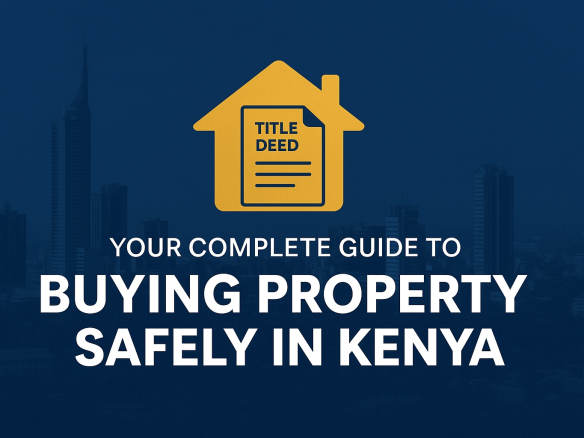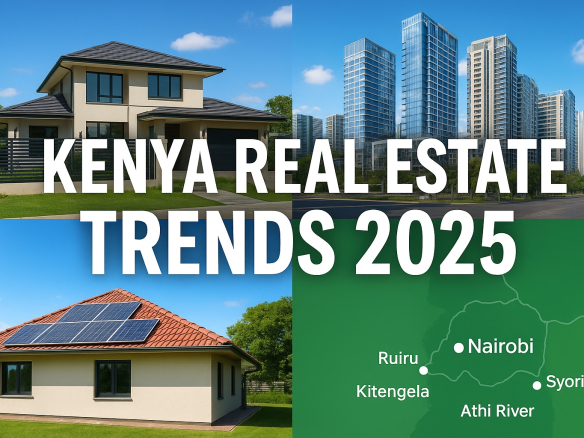Understanding Property Valuation in Kenya: A Comprehensive Guide
Property valuation is a critical aspect of the real estate industry in Kenya. Whether you are a homeowner, investor, developer, banker, or prospective buyer, understanding how property is valued can help you make more informed decisions. In Kenya’s dynamic and sometimes unpredictable property market, knowing the true worth of land or buildings can be the difference between a smart investment and a costly mistake.
This guide will take you through the essentials of property valuation in Kenya, the process, the factors influencing property value, the role of professional valuers, and common pitfalls to avoid.
What is Property Valuation?
Property valuation is the process of determining the monetary worth of a piece of real estate based on specific parameters. It involves a detailed analysis of the physical features, location, legal status, and market dynamics surrounding the property. The goal is to establish the fair market value — the price a willing buyer and a willing seller would agree upon in an open and competitive market.
Valuation is essential for a variety of reasons, including:
- Buying or selling property
- Applying for a mortgage or loan
- Insurance underwriting
- Determining rental rates
- Taxation and government levies
- Legal matters such as divorce, inheritance, court bond, or disputes
- Investment and feasibility studies
Types of Property Valuation in Kenya
There are several types of property valuation depending on the intended purpose:
1. Market Valuation
This is the most common form of valuation and estimates the current market value of a property. It is based on recent transactions involving similar properties within the same location or neighborhood.
2. Forced Sale Value
Used primarily by financial institutions when repossessing properties for defaulted loans. This value is typically lower than market value since the property needs to be sold quickly, often under pressure or at auction.
3. Rental Valuation
This involves assessing the rental income a property can generate. It is commonly used by landlords, investors, and property managers when setting or reviewing rental prices.
4. Insurance Valuation
This valuation determines the replacement cost of buildings for insurance purposes. It excludes the value of land and focuses on the estimated cost of rebuilding the structure in the event of total loss.
5. Rating Valuation
Conducted by local county governments to determine property taxes and land rates payable by owners.
6. Investment Valuation
Used by investors to analyze potential returns from a property based on rental income, capital appreciation, and costs over time.
Who is Authorized to Conduct Property Valuation in Kenya?
Only registered and licensed valuers are legally allowed to conduct property valuations in Kenya. These professionals are governed under the Valuers Act (Cap 532) and regulated by the Valuers Registration Board (VRB).
Professional valuers often belong to reputable bodies such as:
- Institution of Surveyors of Kenya (ISK)
- Royal Institution of Chartered Surveyors (RICS) for internationally recognized accreditation
Before engaging a valuer, it is advisable to verify their credentials and ensure they are duly registered and in good standing.
Factors Affecting Property Valuation in Kenya
Several key elements influence the value of a property. Understanding these can give you insights into how a valuer arrives at the final figure.
1. Location
Location is arguably the most important factor. Properties located in well-developed urban centers like Nairobi, Mombasa, or Kisumu typically command higher values. Proximity to key amenities such as schools, hospitals, shopping malls, and roads also affects valuation.
2. Property Size and Shape
Larger properties or plots tend to be more valuable, but the shape and usability of the land also matter. An irregular-shaped plot may have limited use compared to a well-proportioned one.
3. Age and Condition of Buildings
Well-maintained, modern buildings in good structural condition attract higher valuations. Older buildings may be valued lower, especially if significant repairs or renovations are required.
4. Legal Status and Documentation
A property with a clean title deed and no encumbrances will fetch a higher value. Legal disputes, unclear ownership, or restrictive caveats can significantly lower the valuation.
5. Zoning and Land Use Regulations
Local government zoning rules affect how property can be used. For instance, land zoned for commercial use may be more valuable than land zoned for agriculture in certain areas.
6. Market Trends
Valuers consider prevailing market dynamics, including demand and supply, interest rates, and economic conditions. For instance, during periods of economic slowdown, property values may decline.
7. Accessibility and Infrastructure
Availability of tarmacked roads, street lighting, drainage, water supply, and electricity enhances property value. Poor or limited infrastructure can significantly reduce it.
The Property Valuation Process in Kenya
The valuation process typically follows a structured approach:
Step 1: Engagement
You formally engage a valuer and specify the purpose of the valuation. The valuer will provide a quotation and agree on the terms.
Step 2: Site Inspection
The valuer conducts a physical inspection of the property. Measurements are taken, photographs are captured, and structural details are noted.
Step 3: Market Research
The valuer conducts comparative market analysis by reviewing recent sales or rental data for similar properties in the vicinity.
Step 4: Valuation Analysis
Using recognized methods such as the comparative method, cost method, or investment method, the valuer estimates the value based on collected data.
Step 5: Report Preparation
A comprehensive valuation report is compiled, detailing the findings, methodology used, and final estimated value.
Step 6: Delivery
The report is submitted to the client, or in some cases, directly to a bank or institution as required.
Cost of Property Valuation in Kenya
Valuation fees are regulated under the Valuers Act and typically range between 0.25% and 1% of the market value of the property. However, the cost may vary depending on the complexity, size, and purpose of the valuation. There is also usually a minimum fee, commonly ranging between Ksh 15,000 and Ksh 30,000.
For high-value or specialized properties (like hotels, shopping malls, or industrial complexes), the fee structure may be negotiable or based on a fixed agreement.
Common Mistakes to Avoid in Property Valuation
- Using unqualified or unregistered valuers: This may result in inaccurate reports or legal complications.
- Failing to disclose relevant information: Withholding legal or structural issues may affect valuation accuracy.
- Relying on outdated valuations: The real estate market is dynamic. Always ensure you get a current report, especially when making major financial decisions.
- Assuming valuation equals sale price: Valuation is an estimate, but actual sale price depends on negotiations, timing, and buyer interest.
Importance of Accurate Property Valuation
Property valuation plays a vital role in the real estate lifecycle. It supports:
- Risk management for banks and lenders
- Pricing strategy for sellers
- Due diligence for buyers
- Planning and budgeting for developers
- Equitable taxation and land rates
An accurate and well-prepared valuation report gives all parties confidence and clarity in property-related transactions.
Conclusion
Understanding property valuation in Kenya is essential for anyone involved in the real estate space. Whether you are buying a plot, applying for a mortgage, or selling an apartment, a professional valuation ensures transparency and fair dealing. Always engage a qualified and licensed valuer, understand the valuation process, and ensure the report aligns with your objectives.
With Kenya’s growing real estate market, having a solid grasp of property valuation can give you a competitive edge and help you make more informed, profitable decisions.
Need Help with a Property Valuation in Kenya?
We are a valuation company in Kenya with licensed valuers and real estate professionals across Nairobi, Mombasa, Kisumu, Nakuru, and beyond. Whether you’re an investor or homeowner, contact us for reliable, timely, and affordable property valuation services.





Join The Discussion